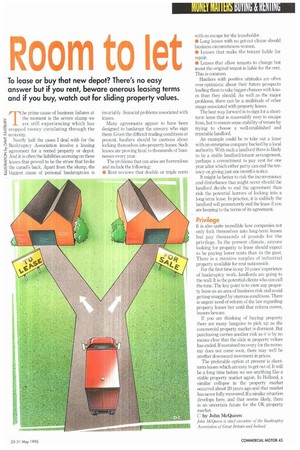Room to let
Page 47

If you've noticed an error in this article please click here to report it so we can fix it.
To lease or buy that new depot? There's no easy answer but if you rent, beware onerous leasing terms and if you buy, watch out for sliding property values.
he prime cause of business failures at the moment is the severe slump we are still experiencing which has stopped money circulating through the Li-, economy.
Nearly half the cases I deal with for the 4 Bankruptcy Association involve a leasing agreement for a rented property or depot.
• And it is often the liabilities accruing on these leases that proved to be the straw that broke .;) the camel's back. Apart from the slump, the • biggest cause of personal bankruptcies is invariably financial problems associated with leases.
Many agreements appear to have been designed to bankrupt the unwary who sign them. Given the difficult trading conditions at present, hauliers should be cautious about locking themselves into property leases. Such leases are proving fatal to thousands of businesses every year.
The problems that can arise are horrendous and include the following: • Rent reviews that double or triple rents with no escape for the leaseholder.
• Long leases with no get-out clause should business circumstances worsen.
• Leases that make the tenant liable for repair.
• Leases that allow tenants to change but insist the original tenant is liable for the rent. This is common.
Hauliers with positive attitudes are often over-optimistic about their future prospects leading them to take bigger chances with leases than they should. As well as the major problems, there can be a multitude of other snags associated with property leases.
The best way forward is to sign for a shortterm lease that is reasonably easy to escape from, but to ensure some stability of tenure by trying to choose a well-established and reputable landlord.
An example could be to take out a lease with an enterprise company backed by a local authority. With such a landlord there is likely to be a stable landlord/tenant arrangement, perhaps a commitment to pay rent for one year after which either party can end the tenancy on giving just one month's notice.
It might be better to risk the inconvenience and disturbance that might occur should the landlord decide to end the agreement than risk the potential horrors of locking into a long-term lease. In practice, it is unlikely the landlord will prematurely end the lease if you are keeping to the terms of its agreement.
Privilege
It is also quite incredible how companies not only lock themselves into long-term leases but pay thousands of pounds for the privilege. In the present climate, anyone looking for property to lease should expect to be paying lower rents than in the past. There is a massive surplus of industrial property available for rent nationwide.
For the first time in my 10 years' experience of bankruptcy work, landlords are going to the wall. It is the potential clients who can call the tune. The key point is to view any property lease as an area of business risk and avoid getting snagged by onerous conditions. There is urgent need of reform of the law regarding property leases but until that reform comes, leasers beware.
If you are thinking of buying property there are many bargains to pick up as the commercial property market is dormant. But purchasing carries another risk as it is by no means clear that the slide in property values has ended. If sustained recovery for the economy does not come soon, there may well be another downward movement in prices.
The preferable option at present is shortterm leases which are easy to get out of. It will be a long time before we see anything like a stable property market again. In Holland, a similar collapse in the property market occurred about 20 years ago and that market has never fully recovered. If a similar situation develops here, and that seems likely, there is an uncertain future for the UK property market.
C by John McQueen
John McQueen is chief executive of the Bankruptcy Association of Great Britain and Ireland.
































































































